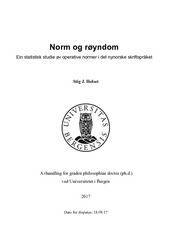Norm og røyndom. Ein statistisk studie av operative normer i det nynorske skriftspråket
Doctoral thesis
Permanent lenke
https://hdl.handle.net/1956/16429Utgivelsesdato
2017-08-18Metadata
Vis full innførselSamlinger
Sammendrag
As a result of special historical and political circumstances, Written Norwegian Nynorsk allows an unusual amount of variation among different spellings and inflectional forms, representing different stylistic subvarieties of Nynorsk such as ‘conservative’, ‘moderate’ and ‘radical’. However, the official norms do not prescribe how the alternatives are combined in actual texts. Officially you may therefore combine forms from different subvarieties in the same text or even the same sentence. However, linguistic observations indicates that in actual usage writers tends to keep their texts within one stylistic layer. Furthermore, present Norwegian language policy is to base the official norm on developments in observed usage. Hence, the main research question of this dissertation is whether the form choices in actual texts could lead us to identify norm clusters showing emerging subvarieties of Nynorsk. In order to investigate this on an empirical basis, I used corpus linguistic methods to extract chosen linguistic variables allowing different spellings and inflectional forms from a large-scale corpus consisting of what may be considered as authoritative texts. For each phenomenon studied all forms of a variable in each text was registered in a table with the texts along one axis and the forms along the other. On the basis of this table and in terms of simple correspondence analysis (SCA), the official norms for Nynorsk defined a multidimensional space. By means of SCA each text was located as a point within the subspace defined by the spellings and inflectional forms occurring within it, while each form was located as a point within the subspace defined by other forms occurring in the same texts. According to the interpretation rules of SCA the most common forms, typical of most texts, will occur close to the centre of the diagram, while rarer forms occur more peripherally, and near opposite edges to the extent that they tend to be mutually exclusive. Hence, observations of a clearly defined norm cluster consisting of certain forms, will then approach the status of a subvariety of Nynorsk. The study concludes that there is an emerging subvariety consisting of a continuum from moderate to slightly radical forms within the material. Hence, the results may be used as an argument to lead the official norms towards a narrower moderate Nynorsk, excluding typical radical and conservative forms.
